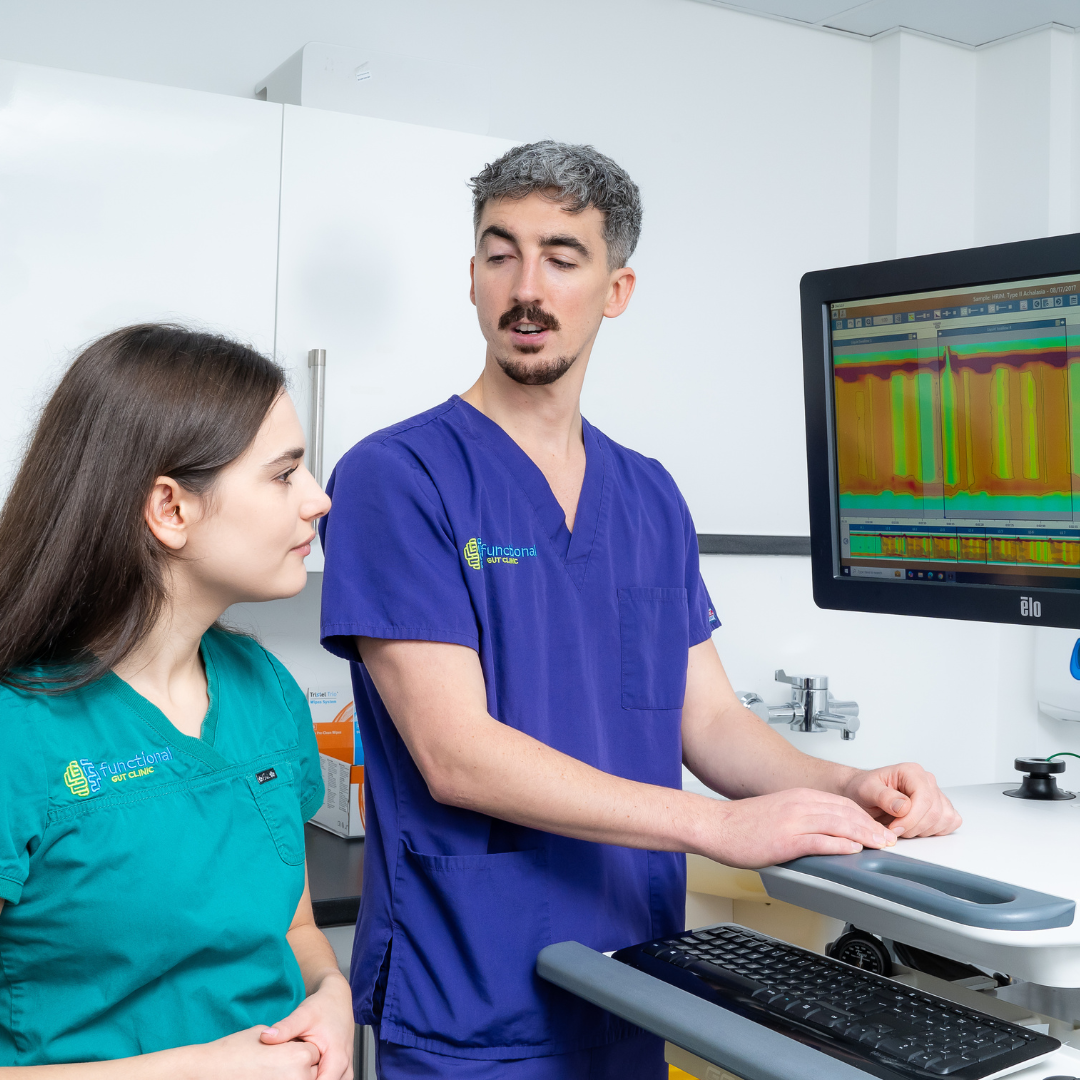Bloating
Struggling with bloating? Here’s what you need to know to find relief.
ALL TEST ARE ACCREDITED & REGULATED BY



What is bloating?
When you’re bloated, your stomach or abdomen can feel full and uncomfortable, or even painful.
This bloating happens when your gastrointestinal tract contains too much gas or air. Bloating can be mild, or more severe, and may present as:
– A visibly distended or swollen abdomen
– Feeling very full and uncomfortable
– Feeling of tightness in the abdomen
– Excess gas – belching and/or flatulence
– Rumbling or gurgling
There are several causes of bloating, so it’s important to diagnose the cause of your bloating and find out why it’s happening to you.

Why does bloating happen?
Prolonged periods of bloating could indicate an underlying health problem, if so you should see your GP.
Possible causes can include:
Irritable bowel syndrome (IBS diagnosis)
Ulcerative colitis, a form of inflammatory bowel disease (IBD), where the inner lining of the large bowel is inflamed and develops ulcers
Crohn’s disease, the other form of IBD, where some parts of your colon are inflamed
Too much bacteria in your small intestine (called small intestinal bacterial overgrowth, or SIBO)
Gastroesophageal reflux disease
Food intolerances, especially lactose or fructose intolerance
Producing too much gas (dysbiosis and fermentation)
Weight gain
Stress or anxiety
Delays in your food and drink moving on from your stomach (called gastroparesis)
Eating too quickly, so that you swallow too much air (called aerophagia)


Diagnosing bloating
Feeling bloated is no fun, but once you know what’s going on you can start to manage your symptoms and the underlying causes.
Testing options:
At the Functional Gut Clinic, we can run the following tests to diagnose the causes of bloating:
Gastric emptying test– which measures how quickly food leaves your stomach
Carbohydrate malabsorption breath test– which finds out if you have certain food intolerances (lactose or fructose)
Small intestinal bacterial overgrowth (SIBO) breath test– which finds out if you have an overgrowth of bacteria in your small intestine (called SIBO)
Oesophageal manometry– which measures the function of your oesophagus (food pipe)
24-hour pH impedance monitoring– which looks at whether you have any reflux
Colonic transit study-a non-invasive test which looks at how long it takes for faeces to pass through your bowl
Learn more about bloating

Irritable Bowel Syndrome (IBS) vs Inflammatory Bowel Disease (IBD)
By Jordan Haworth, GI Physiologist
The gastrointestinal (GI) tract is a complex system that is responsible for the digestion and absorption of nutrients from the food we eat.
Unfortunately, it is also a common site for the development of various digestive disorders.
Two such conditions that can significantly affect the quality of life of those affected are irritable bowel syndrome (IBS) and inflammatory bowel disease (IBD). Although these conditions share some symptoms and are often confused, they are different conditions with distinct causes, diagnostic criteria, and treatment options.
What is IBS?
Irritable bowel syndrome (IBS) is a functional gastrointestinal disorder that is characterised by recurring episodes of abdominal pain, bloating, gas, and changes in bowel habits, including diarrhoea, constipation, or both. IBS does not cause recognisable inflammation or damage to the intestinal lining, and there is no specific test or imaging study to diagnose it.
The exact cause of IBS is not fully understood, but it is believed to result from a complex interaction between the brain and the gut. Factors such as stress, anxiety, changes in diet or physical activity, and gut microbiota imbalances may trigger or exacerbate symptoms in susceptible individuals.
Diagnosing IBS
The diagnostic criteria for IBS typically involve three main components: symptoms, duration, and exclusion of other potential causes.
The symptoms of IBS can vary widely from person to person but generally include recurrent abdominal pain or discomfort that is associated with changes in bowel habits. These changes can include diarrhoea, (IBS-D) constipation, (IBS-C) or a combination of both, (IBS-M), as well as changes in the consistency or appearance of stool. Other common symptoms may include bloating, gas, and a feeling of incomplete bowel movements.
To meet the diagnostic criteria for IBS, patients must experience these symptoms for at least six months. Additionally, healthcare professionals must rule out other potential causes of the symptoms, such as inflammatory bowel disease, celiac disease, or colon cancer, through a series of tests and exams.
Treatment options for IBS
One common approach to treating IBS is through dietary changes. Many individuals with IBS benefit from a low FODMAP diet, which eliminates certain types of carbohydrates that can trigger symptoms. Additionally, fibre supplements or probiotics may be recommended to help regulate bowel movements and improve gut health.
Medications can also be used to manage IBS symptoms. Antispasmodics can help relieve cramping and abdominal pain, while laxatives can help alleviate constipation. In some cases, antidepressants may be prescribed. The reason antidepressants are used to treat IBS is because they typically target serotonin receptors and serotonin has many roles in the gut, such as controlling how the gut moves and how the gut senses pain. They may also help to address the anxiety and depression that often accompany IBS.
Another treatment option for IBS is psychological therapy. Cognitive behavioural therapy (CBT) can help individuals with IBS identify and change negative thought patterns and behaviours that may be contributing to their symptoms. Relaxation techniques such as yoga, meditation, or deep breathing exercises can also be helpful in reducing stress and promoting overall wellness.
Ultimately, the best treatment plan for IBS will depend on the individual and their specific symptoms. Working with a healthcare provider to develop a personalized treatment plan is essential for managing IBS and improving overall quality of life.
What is IBD?
Inflammatory bowel disease (IBD) is a chronic inflammatory disorder that affects the digestive system. It refers to a group of conditions that cause inflammation and damage to the lining of the GI tract.
The two most common types of IBD are Crohn’s disease and ulcerative colitis. Crohn’s disease can affect any part of the digestive tract, from the mouth to the anus, while ulcerative colitis affects only the colon and rectum.
Diagnosing IBD
Diagnosing IBD can be a challenging process as its symptoms can be similar to other gastrointestinal disorders. However, there are some key indicators that physicians use to diagnose IBD.
Firstly, a detailed medical history and physical examination are taken to understand the patient’s symptoms and any possible risk factors. Laboratory tests such as blood and stool tests may also be conducted to identify any inflammation or infection. Imaging studies such as endoscopy or colonoscopy may be used to examine the digestive tract and obtain tissue samples for analysis.
Additionally, specialized tests such as capsule endoscopy or CT enterography may be utilized to evaluate the extent of the disease. With accurate diagnosis, appropriate treatment can be initiated to control symptoms and reduce complications. Regular monitoring and follow-up care are essential for individuals with IBD to manage the disease effectively.
Treatment options for IBD
One of the primary treatment options for IBD is medication, which may include anti-inflammatory drugs, immunosuppressants, or biologics. These medications work to reduce inflammation in the digestive tract and prevent the immune system from attacking healthy tissue.
In addition to medication, dietary changes can also play an important role in managing IBD symptoms. Some people with IBD may need to avoid certain foods that trigger inflammation, while others may benefit from a high-fiber diet. However, even people with IBD in remission still experience IBS-like symptoms of bloating and abdominal pain, and it is entirely possible to have IBS if you have IBD. You can read more about the causes of IBS in IBD here.
Surgery may also be an option for people with severe cases of IBD, particularly if medications and dietary changes are not effective. Surgery can involve removing part of the intestine or colon, which can help alleviate symptoms and improve quality of life.
Finally, lifestyle changes like stress management and regular exercise can also help reduce symptoms and improve overall health for people with IBD. While IBD can be a challenging condition to manage, with the right treatment and support, many people with IBD are able to lead full and active lives.
At the Functional Gut Clinic, we have a comprehensive range of tests that can give an overview of your gut health and lead to a gut health diagnosis.
We combine the very latest diagnostic technology with a team of dedicated specialists to offer a trusted, proven and reliable service that swiftly identifies the problem with your gut health; then connects patients with precisely the right treatment to alleviate symptoms or put things right.
You can fill in our self-referral form to see if you might be suitable for our diagnostic testing, or alternatively get in touch with our friendly team with any specific questions about treatment options.
Hear from people we’ve helped, just like you.
"Very professional while welcoming and friendly"
"The manner and demeanour of all staff from reception to people carrying out the test was very professional but welcoming and friendly. Atmosphere is very relaxed and all instructions clear and concise."
London Patient

"Highly recommend this"
"Thanks to Dr Hobson and everyone at the Functional Gut Clinic. The whole team is very kind and generous and they are doing things that are cutting edge and they actually get results."
Manchester Patient

"Highly recommend this"
"After stopping my lansoprazole, every time I had a warm drink, I could feel it burn all the way down to my stomach. Thank you to Sam for making me feel at ease." - Manchester Patient

"My experience could not be better"
"Pleasant and knowledgeable staff that made the experience more enjoyable than it should be!" - London Patient

"Very friendly and knowledgeable"
"An excellent service from beginning to end. I would recommend to anyone who was considering having testing done. Very friendly and knowledgeable!" - Manchester Patient

"Very kind and helpful"
"It was also great to have time to talk to the clinicians – very important when you have problems. Reception staff also very kind and helpful." - Manchester Patient

Are you experiencing any other symptoms
Symptoms are often closely connected. Find out more below.
Reflux

Burning mid-chest, worse when bending or lying down
Constipation

Difficulty going to the toilet, unusual stools, often with stomach ache or intestinal cramps, bloating, nausea or appetite loss
Heartburn

A burning pain in your chest, just behind your breastbone.
The pain is often worse after eating...
Regurgitation

Bringing food or drink back up, difficulty swallowing, feeling that food or drink is stuck in your throat, horrible taste in your mouth
Swallowing Issues

Dysphagia - difficulty swallowing, feeling that food or drink is stuck in your throat, horrible taste in your mouth
Diarrhoea

Loose or explosive stools, can’t get to a toilet in time
Abdominal Pain

Cramps; sharp or dull pain, Bloating, Excessive belching, Nausea or vomiting
Faecal Incontinence

Stools leak unexpectedly, Can’t get to a toilet in time
IBS

Abdominal pain or cramping, bloating, changes in bowel habits and urgency, gas

